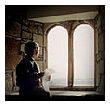Home »
Posts Tagged "490"
Posted by Anne on Oct 3, 2014 in Writing | 2 comments
Today is Yom Kippur—the Day of Atonement—the holiest day of the year for the Jewish people.
On this day about 1980 years ago, Jesus and his disciples were as far away from the temple in Jerusalem as it was possible to be while still remaining in Israel. They were at the entrance of another temple entirely—a pagan one.
While back in Jerusalem the high priest was entering the Holy of Holies, Jesus was in front of the ‘Gates of Hell’ at the temple of Pan, asking his disciples who they thought he was. Simon finally comes out with: ‘You are the Messiah.’
Whereupon Jesus gave him a new name: Cephas or Peter.
Peter from the Greek petros means ‘rock’. Cephas is Hebrew for a very specialised type of rock: the cornerstone on which a threshold sacrifice was offered.
Cephas is related to kippur, the name of the day. It is also related to Caiaphas, the name of the high priest who was then presiding on the Day of Atonement.
read more
Posted by Anne on Aug 8, 2013 in Mathing, Writing | 6 comments
Ever had that moment when the scales fall off your eyes? When the veil falls away and it strikes you the situation is not what you think it is?
I had such a moment recently when I was digging (yet again!) in Ephesians 6. As I noted in The Story of a Cover, there’s an allusion to the rose of Sharon in the armour of God. Actually, upon further investigation, it transpired there are—surprise, surprise!—seven flowers.
What’s an entire layer of subtle references to Israel’s flora doing in the Armour of God? Good question. But it’s not the only layer:
- Surface layer: the accoutrements of Roman armour—helmet, breastplate, belt, sword, shield, shoes—plus an extra bit of protection in prayers and hymns.
- Sub-surface layer 1: the elements of a threshold—pillars, lintel, gates, threshold stone, mezuzah, seals, door. These do not correspond in a one-to-one fashion to the Roman armour, but are based on puns. For instance, the word for ‘darts’ (as in fiery darts of the Evil One) comes from belos, threshold while the word for ‘shield’ doubles as a word for door. With a single exception, these are Greek puns and I have no doubt the average reader would have spotted them immediately.
read more
Posted by Anne on Jul 31, 2013 in Writing | 11 comments
I’m single. I always have been.
From time to time across the years, a well–meaning (invariably married) friend would warmly commend a book or a seminar on singleness to me.
Once upon a time, I’d act on the recommendation but after a while I learned better. Books and seminars tended to regard ‘singleness’ as that temporary state of being between two marriages. They had nothing for a girl twenty years, thirty years, forty years… and more… unmarried.
In the end, I couldn’t stand this kind of book. What, I asked, could someone who had been single for the eternity of five years after a divorce tell me about the topic?
Not long after beginning to write God’s Panoply, I realised that one of the sweeping themes in it was marriage. I was horrified. I mean: if I hated people telling me about singleness when the most they knew about it was a couple of years prior to a re–marriage, how could I dare to write about marriage?
I delayed when it came to the writing, talked to God, pleaded with Him, argued that He must have called a married person to write the same ideas… All I got by way of answer was: ‘No one can ever accuse you of having a hidden agenda.’
read more
Posted by Moderator on Apr 14, 2011 in Reviews | 0 comments
HOW SWEET THE SOUND
Meredith Resce
Golden Grain Publishing
Parable, fantasy, romance, allegory: How Sweet the Sound defies categorisation into any tidy or specific box. It is light without being frothy, tender without being syrupy, otherworldly without being unnatural, symbolic without being incomprehensible. Its footprints touch the ground nimbly in a number of genres without planting themselves firmly in any of them.
read more

